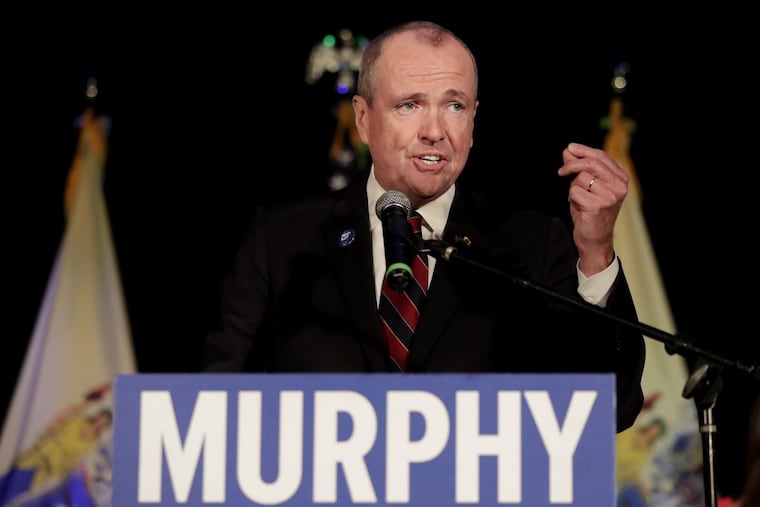How the GOP tax overhaul could ruin Phil Murphy's plan to tax New Jersey millionaires
Leading Democrats in Trenton have warned that congressional efforts to eliminate or cap the state and local tax deduction could imperil plans for the so-called millionaires' tax in the Garden State.

New Jersey Gov.-elect Phil Murphy campaigned on a promise to raise taxes on thousands of wealthy residents to pay for a sweeping progressive agenda that includes more money for schools, public workers' pensions, and transit.
At least one component of that plan seemed like a layup: The Democratic-controlled Legislature has voted five times since 2010 to raise taxes on millionaires. Gov. Christie's veto pen was the only thing that stood in the way.
But now, the GOP proposal in Washington to overhaul the tax code may throw a wrench into Murphy's plans to create what he calls a "stronger and fairer" economy in the Garden State. Leading Democrats in Trenton have warned that the Republican-led congressional efforts to eliminate or cap the state and local tax deduction could imperil plans for the so-called millionaires' tax.
"If this [tax overhaul] actually does happen, I am very concerned about the exodus of wealthy people … that pay a large portion of our tax base," Senate President Steve Sweeney (D., Gloucester) said in an interview with Fox Business on Tuesday. "It's something we can't just cavalierly go forward with and think, 'Oh, we don't have to worry about it, they're always going to be here.' "
The tax fight also shows the hurdles Murphy faces in keeping his pledge to stand up to President Trump.
And it comes as lawmakers and other Trenton observers wonder how Murphy will roll out his agenda. Some New Jersey Democrats fear that they could look just as gridlocked as Republicans in Washington — who stumbled out of the gate with a botched effort to repeal the Affordable Care Act — despite retaining control of both houses of the Legislature and retaking the governor's mansion in this month's elections.
Murphy's Republican opponent in the governor's race, Lt. Gov. Kim Guadagno, warned in a campaign ad that if he delivered on his tax promises, he would be "the only one who can afford to live in New Jersey."
A day after Murphy was elected, Sweeney said raising taxes on millionaires would be the Legislature's first priority when Murphy takes office in January.
By the following week, House Republicans in Washington had passed their tax bill.
Republicans want to lower taxes for corporations, reduce income tax rates in some brackets, and increase the standard deduction. To pay for it, they propose scaling back or eliminating a number of tax breaks, including the deduction for state and local taxes.
Current law allows people to write off a number of taxes they pay to their state and local governments, such as levies on real estate, personal property, income, and sales.
About 40 percent of tax filers in New Jersey claim the deduction, for an average amount of $18,000, according to IRS data. Scrapping the deduction is projected to save $1.8 trillion over the next decade.
The House version of the Tax Cuts and Jobs Act would allow taxpayers to deduct up to $10,000 on real estate taxes. The Senate, currently planning to eliminate the state and local deductions altogether, is set to take up its bill after it returns from the Thanksgiving recess.
"We have to hope and pray and do everything we can to make sure the Senate comes out in a different place than the House," Murphy told reporters Monday in Trenton. "That's Job Number One that's immediately before us."
Murphy says he wants to raise taxes on millionaires to "fully fund" public schools, which he argues Christie underfunded by $9 billion over eight years.
The state would need to spend $1 billion more annually, or about 3 percent of its $35 billion budget, to comply with its school-funding formula.
It's hard to imagine that Murphy could come close to meeting his education-funding goals without the income tax hike. Nearly 20,000 tax filers reported more than $1 million in taxable income in 2014, the most recent year for which state Treasury Department data were available. Budget analysts estimate the tax could produce $650 million annually.
Sweeney proposes raising the tax rate on income above $1 million from 8.97 percent to 10.75 percent. Former Democratic Gov. Jon Corzine added that top rate for one year in 2009; Christie nixed it when he took office the following year.
Murphy has not released a specific tax plan. He also proposes legalizing and taxing marijuana and closing "corporate loopholes" he says allow companies to park profits in lower-tax states.
Also on Murphy's agenda: nearly doubling the state minimum wage to $15 and mandating that employers provide paid sick leave. But in recent years Democrats have sparred over how to reach those goals.
How Murphy handles the tax fight — and negotiates school-funding priorities with other Democrats like Sweeney — may set the tone for these and other debates in his first 100 days.